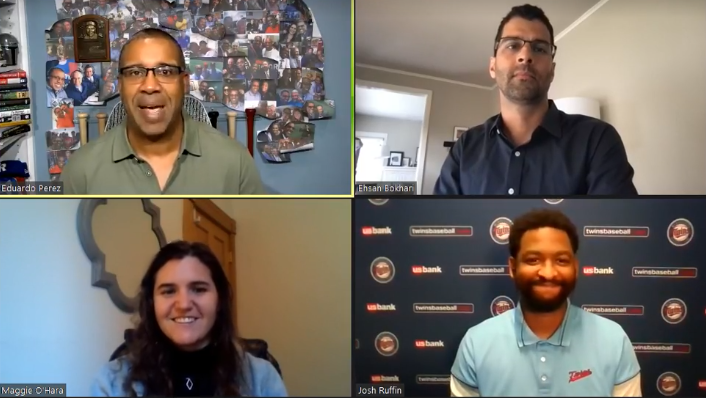2021 SABR Analytics: Watch highlights from the Analyze This panel discussion
At the SABR Virtual Analytics Conference on Saturday, March 13, 2021, a panel discussion was held on Analyze This: The Varying Roles and Skillsets of Baseball Analysts.
Thanks to MLB’s Diversity and Inclusion Department, all baseball fans were invited to join us on Facebook Live to watch a free livestream of this panel.
The Analyze This panel included Ehsan Bokhari, Senior Director of Player Evaluation, Houston Astros; Maggie O’Hara, Senior Analyst in Baseball Operations, Detroit Tigers; Josh Ruffin, Advanced Scouting Analyst, Minnesota Twins; and moderator Eduardo Perez, ESPN analyst and former major-league infielder for 13 seasons.
- Video: Click here to watch a replay of the Analyze This panel on YouTube
- Audio: Click here to listen to the Analyze This panel (MP3; 1:02:03)
Here are some highlights:
ON THE VALUE OF COMMUNICATION FOR ANALYSTS
- Bokhari: “Quantitative skills in general are becoming more and more important and it doesn’t matter if it’s a position in R&D, I think quantitative skills are going to be important in just about any position that you are going to take in baseball. It doesn’t matter if you’re working on the development or with the coaches or in scouting. You are going to need to be able to interpret the metrics and the data that are now available, but specifically for a quantitative or more technical position. Some things that we really like to see are some demonstrated work that shows that you’re thinking about … baseball problems. It doesn’t necessarily have to be about baseball — it always helps if it is — but some demonstrated work showing off your skills, you know, starting from data cleaning, all the way to communication of results.”
- O’Hara: “So much of what we do is, you’re talking about visuals and I think anything that we are trying to bring to a player or coach … whether it’s some sort of heat map or color-coded, we try to make things as simple as possible and understandable as possible. … Even the question of explaining models, the people that are actually going to utilize them are not going to understand them as well as the handful of people in your department who built them. So being able to disseminate that information to coaches or [players] … it comes down to having really good communication and relationships that you build along the way.”
ON SOAKING UP NEW INFORMATION
- O’Hara: “When you’re an intern in a new organization, it is hard to explain how much data there really is. When you’re actually in a major-league operation, there’s a ton of stuff (available) you can only scratch the surface of from the public side of things. The most important (quality) is just being willing to learn and being willing to understand what is going on. … And show that you have something unique to bring. You just learn so much when you’re in a baseball operations department and just being able to listen and ask questions, I think that really goes a long way.”
- Bokhari: “This is something that I picked up from my time when I was teaching — don’t assume that people aren’t asking questions because they don’t have them. That could be challenging because you constantly ask people if they have questions and you don’t get any response, but don’t assume that just because you are not getting any responses that they don’t have questions.”
ON ADDING MORE DIVERSE VOICES TO FRONT OFFICES
- O’Hara: “There is a lot to unpack there and I definitely know that when you are trying to get into the game, that is certainly in the back of your mind. ‘Is this part of the reason why I am not getting this job?’ … Once you’re at a point where you’re looking for those jobs and you’re talented enough and qualified, I think major-league teams do a good job of bringing more people in that are qualified. … But I think it’s part of a bigger problem, in that — are we doing enough to help people who are younger see themselves having this sort of a job? I think that is something that is certainly getting better every day.”
- Ruffin: “I think it’s important on all fronts. … You don’t necessarily want to feel like you’re fitting in all the time. You are coming into a new culture and you might stand out, but that is a good thing. Diversity is important and it is important to bring that side of you and be yourself and blaze that path, if you will. … As Maggie was saying, it is super helpful when you start seeing people like you above you moving up, and that makes it so much easier and ascertainable for people on the outside looking in to be like, ‘Hey, I can do that.’”
ON STANDING OUT AS A JOB CANDIDATE
- Ruffin: “You want to try and find some skill set or something you have that helps you stand out. I think a lot of people come in and say ‘Hey, I really love baseball’ and that is obviously important. We are looking for people who can help us go into new avenues, explore new strategies and tactics. Having a skill set that helps you tackle that is what stands out to us, even beyond just being able to do coding or anything. Something that makes you unique.”
For more information on the 2021 SABR Virtual Analytics Conference, visit SABR.org/analytics.
Transcription assistance from Kelly Vanegas.
Originally published: June 1, 2021. Last Updated: June 7, 2021.


